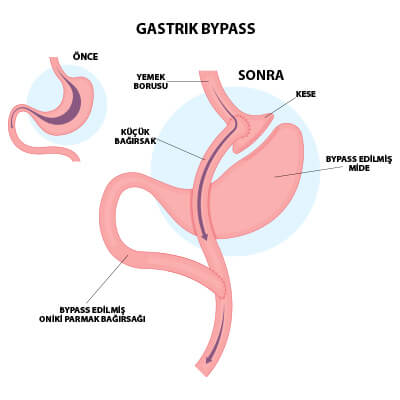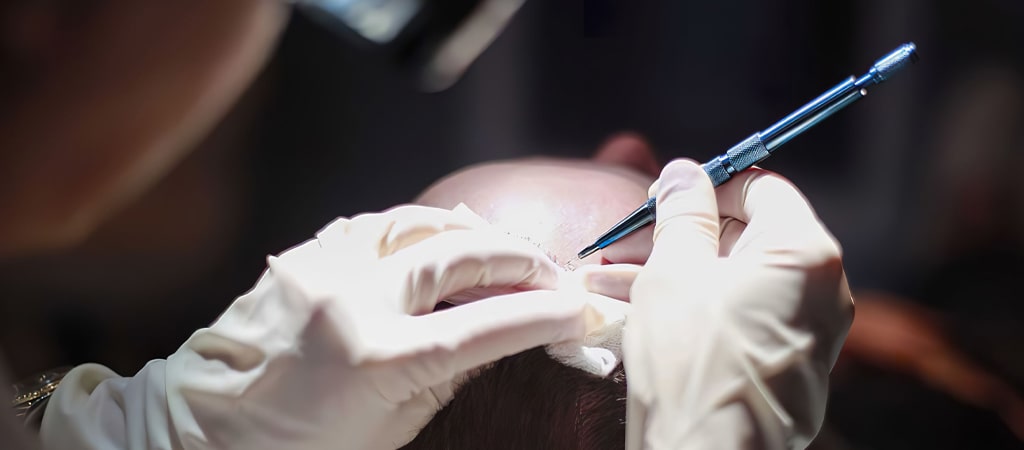What is a Gastric Bypass (R-NY) Surgery?

Gastric bypass surgery is a type of surgery which falls under the Obesity surgery category and is a preferred option for type 2 diabetes patients. The operation is a popular option in obesity surgery, for its high success rate.
Patients who struggle to lose weight through the regular way of diet and exercise search for the best cure to lose excess weight and most importantly want to welcome a new healthier lifestyle. A Gastric bypass procedure can help patients reach their ideal weight and regain their health.
It’s also possible to achieve permanent weight loss with this procedure. As the stomach is reduced in volume, the feeling of fullness and satisfaction is felt much earlier, which then leads to weight loss.
However, it is very important for patients to consider the doctor’s recommendations in order to reach a healthy weight before and after surgery.

Who Is A Gastric Bypass Surgery Suitable For?
With obesity surgery, the body mass index (BMI) of the patient is analyzed to determine the type of surgery that will be required. For a gastric bypass surgery, the body mass index should be between 35-40.
Together with the BMI, patients with additional health problems including sleep apnea, hypertension, type 2 diabetes, which are seen with excess weight, may wonder if the procedure is suitable. Patients who carry these health problems and risks may be able to undergo the surgery, if seen appropriate by the doctor. It is very important that patients are examined by doctors who are experts in the specific field, especially to achieve a successful result. After a thorough examination the doctor can decide whether this option can be applied or not.
How Is A Gastric Bypass Surgery
Performed?
The steps of a Gastric bypass surgery are as follows:
- The closed surgery operation is performed by a laparoscopic procedure.
- The operation is performed via robotic arms through 4-6 1 cm incisions made in the patient’s abdomen. The operation time is approximately 4-5 hours.
- Just like in a sleeve gastrectomy procedure, the stomach is reduced and approximately 95% of the stomach is bypassed.
- The first part of the stomach, which is divided into two during the operation, is attached to the middle of the duodenum. The other half is not removed from the body and is allowed to continue its function.
- With this procedure, food is prevented from passing through the duodenum intestine. In this way, patient have the feeling of fullness with less food and to ensure the absorption of some of the food taken.
- After the operation, the person is kept under observation for 3 days in the hospital.
It is absolutely vital that a Gastric bypass surgery is performed by experts, to gain a successful result. An unsuccessful surgery will affect weight loss rate and the quality of life afterwards.
What Is Recovery Like After A Gastric Bypass Surgery?
A Gastric bypass surgery which is used in Bariatric surgery is popular for its high success rate and obtaining positive results. After the procedure, patients are kept in the hospital for 3 days under observation by the doctor who performed the surgery. Medical check ups and constant care are carried out during the patient’s stay.
A nutrition and exercise program recommended by the doctor is of high importance during the recovery time. Following the criteria set out in the program is important for healing, ensuring a positive outcome of the surgery and a shorter recovery time.The healing period after a gastric bypass operation takes between 4-6 weeks. Complete result can be seen at the end of 12 months.
Advantages Of A Gastric Bypass Surgery
A gastric bypass surgery allows for definitive results in losing excess weight. Other advantages include:
- The hunger hormone released by the stomach is slowed down.
- After the surgery, the patient feels less hunger.
- With the shrinkage of the volume of the stomach, after the surgery the patient feels satisfied with less food.
- With the feeling of fullness with less food is achieved, the patient can adapt to a diet easier thus speeding up weight loss.
To benefit from the three advantages above, it is vital that operation is performed by doctors who are experts in the field for successful results. An unsuccessful surgery will affect weight loss rate and the quality of life afterwards.
Gastric Bypass Surgery FAQs
What are the risks of a Gastric bypass surgery?
What are the risks of a Gastric bypass surgery?
Gastric bypass surgery is a procedure in the abdominal area, similar to other surgeries, postoperative intestinal obstruction, bleeding, infection, hernia and other complications due to general anesthesia may occur. Leakage between the stomach and intestine is the most likely negative outcome of this surgery - in such cases, the patient will need to be operated on a second time.
Although a highly successful surgery, risk factors may occur due to many factors including health problems of the patients or not strictly following the doctor's recommendations. Therefore it is important to stay in touch with your doctor until the full healing process is complete.
What does a diet after a gastric bypass surgery look like?
What does a diet after a gastric bypass surgery look like?
As the operation involves significant shrinkage of the stomach, patients' diet must also change accordingly.
The steps to be taken are as follows:
It is important that patients strictly follow the nutrition program given by the physician without going out of the requirements.
In the first few weeks, It is recommended to consume liquids and foods with no spices.
Consume 1.5-2 liters of water per day to prevent dehydration.
It is important to consume only fat-free foods.
Regular intake of carbohydrates, proteins and other vitamins for a better healing process.
Does constipation occur after a gastric bypass surgery? What should be done?
Does constipation occur after a gastric bypass surgery? What should be done?
As this surgery affects the intestines, bowel habits and movements may also change as a result. After surgery, toilet frequency may be every 2-3 days. To prevent constipation, patients are generally advised to choose fiber-rich foods. Foods like baked beans, fruits and vegetables are some of the recommended options by the doctor to prevent constipation.
What are the sweet foods to avoid after a Gastric bypass surgery?
What are the sweet foods to avoid after a Gastric bypass surgery?
Dumping syndrome is when the stomach suddenly empties, which may occur after a Gastric bypass surgery. To prevent this from happening, there are foods that must be avoided. Some of these include:
Popsicles
Ice cream
Sugar
Milk chocolate
Lemonade
Fruit yogurts
Tea with sugar
Fruit syrups
Jam and honey
Sweet bakery items
By avoiding foods high in sugar, and following a healthy eating routine, patients can avoid a dumping syndrome situation.
In order to gain quality of life and live a healthy and long life, patients must be able to pay extra attention to their diet and create new healthy habits after the surgery.





